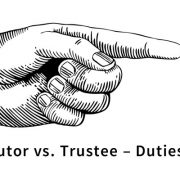What’s the Difference Between a Living Will and Last Will and Testament?
Cleveland, Ohio estate planning attorney, Daniel A. Baron, offers the following helpful answers to your questions about the difference between a Living Will and a Last Will and Testament.
Confusing these terms happens quite frequently as there are those that think that these are one in the same, however, they are entirely two distinct legal documents which cover many different needs.
A Living Will, what is it and do I need one?
Should you become extremely ill or completely incapacitated and cannot convey their medical care wishes; having a living will in place, (which is a legal document AKA as an advance directive), gives instructions as to the medical care you wish to receive.
Some of the details of a Living Will would include
- Do I want to be placed on a breathing tube
- Do I want a feeding tube
- Would I rather not be resuscitated (AKA DNR – Do Not Resuscitate)
Also, at this point it would be wise to consider having a Power of Attorney put in place in the event that you do become incapacitated so that there is someone making sure that your wishes are carried out as you have communicated in your Living Will. Naming a Power of Attorney can be done at the time of penning your will.
Last Will and Testament, is it different than a Living Will?
Your last will and testament, also simply known as a will, is a legal document that stipulates the transferring of your estate to somebody else by sale or gift upon your demise. Should you pass away without a will, your assets then become “intestate”. At this time state intestacy laws govern the distribution of your assets.
If you have minor children, you should unquestionably have a will. At the same time of the writing of your will, it is possible for you to name a guardian for your minor children. You can also name the guardian to manage the minor’s financial affairs or another party to act on behalf of the children.
As you are drafting your will, it will be necessary for you to select an Executor of your estate. The Executor is one who carries out the will’s requests throughout the process of probate.
Living Will and Last Will – when do they take effect?
Now that you are aware of the differences between a Living Will and a Last Will, you may question as to when the two take effect.
Keeping in mind that the Living Will outlines your medical wishes should you become incapacitated or seriously ill and unable to convey your wishes, this comes into play while you are still alive but unable to voice your wishes.
To stipulate your wishes of how to distribute your estate upon your passing comes into play by using a Last Will and Testament .
So as you can see a Living Will and a Last Will and testament are two separate, but very important legal documents for everyone to have in place.
Living Will vs. Last Will?
If you are pondering the questions as to whether you need a last will or a living will. The answer to that question should be very easy; just about everyone should have both. Each of these important documents are ones that every person doing their Estate Planning should secure as these offer you the peace of mind that your wishes will be followed when you can’t make them known due to a serious illness and/or incapacitation or death.
Having a last will and testament, also makes the probate process go more smoothly, and with a living will, it can provide direction to your loved ones or Power of Attorney, in making challenging decisions during a stressful and difficult time.
So when is the best time for me to get a living will and a last will?
Unless you have a crystal ball which states otherwise, the future is uncertain. Securing both a living will and a last will and testament and recording your wishes is best done sooner than later.
Both a Living Will and a Last Will and Testament are only two of the many parts to a comprehensive estate plan. For information regarding living wills, trusts, power of attorney, or a pour-over will, or further questions on Powers of Attorney, contact Daniel A. Baron of Baron Law at 216-573-3723 to make an appointment.













